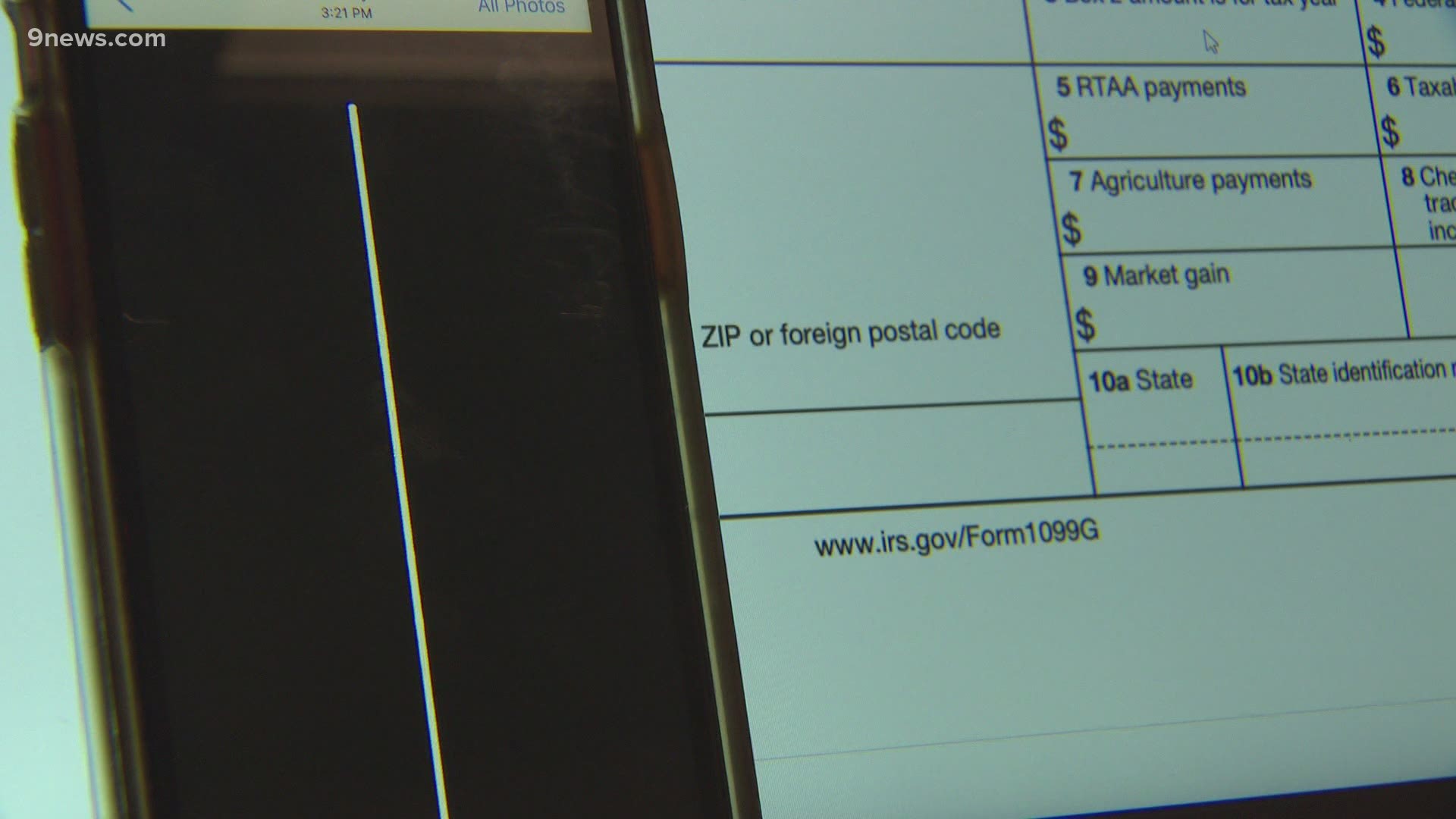COLORADO, USA — As Colorado residents begin filing unemployment taxes, many receiving unemployment checks may owe money.
All unemployment benefits are taxable income, and that includes the $600 and $300 enhanced benefit payments attached to unemployment benefits approved by the CARES Act in 2020.
9NEWS spoke to tax expert Michelle Moore of Mile High TaXperts on what options taxpayers have if they can't afford the lofty bill.
(Editor's note: Responses have been edited for context and clarity.)
Why would someone receiving unemployment benefits owe money?
Moore: Unemployment benefits, including the special benefits that were designated by Congress through the CARES Act, are all considered taxable income, so typically, what's going to end up happening, is that taxpayers either didn’t elect to withhold taxes from that benefit when they signed up or they’re losing credits they were otherwise accustomed to receiving.
What if an unemployment recipient did elect to have taxes taken out. Why would they still owe money to the IRS?
Moore: They may have either not withheld as much as they thought they did. Ten percent is what the IRS recommends.
It could also be the unemployment agency itself didn’t enact the tax withholding right away, so there may have been a few benefit periods that lapsed in tax withholding.
Or it could be the loss of credits that they're used to receiving on a tax return. Unemployment benefits are not considered earned income, and other income is, and so there are tax credits related to earned income that a lot of taxpayers are used to receiving that wouldn’t be applicable to a tax return that’s only reporting unemployment compensation or is largely reporting unemployment compensation.
If a taxpayer cannot afford to pay the bill in full immediately, what are their options?
Moore: If a taxpayer owes on a 2020 tax return, they have different options depending on whether it’s federal or a state bill.
With the IRS, their options are going to fall into predominately one of five categories:
- They could pay the tax in full either with their return, or they can request an extension of about 120 days.
- They could enter into a short-term payment plan, which is to repay that debt within 180 days.
- They can enter into a long-term payment plan, which is stretched over 60-72 months.
- They could request what is currently "uncollectable status," which means the IRS freezes collection of that debt for a period of at least 12 months
- They could seek a settlement, which is referred to as "an offer in compromise."
The latter two are going to require the person to give financial proof to the IRS that they cannot afford a payment plan, but the first three don't require any of that disclosure unless the debt itself is over $50,000.
In the state of Colorado, the main option is going to be entering into a payment plan that stretches over 36 months, and that payment can be as low as $25. There are alternative options similar to what the IRS offers, but those options are much more challenging to reach on the state level, particularly if it’s a small debt.
RELATED: Verify: If you don't need one, you shouldn't create an unemployment account to prevent fraud
Would someone who withdrew from their 401k be taxed for that as well?
Moore: The 401k planned distributions are typically subject to both income tax as well as an early withdrawal penalty of 10%. That being said, COVID-19 Cares Act did allow a waiver of that 10% penalty if taxpayers fall into a certain criteria; one being the taxpayer, the spouse of the dependent were diagnosed with COVID-19 during 2020 or if the taxpayer can establish they suffered a financial consequence that was related to a COVID-19 quarantine, job loss or inability to work.
So if they fall into either of those two categories, they would qualify for at least the 10% waiver but they would still have to pay income taxes on that distribution, unless they repaid it within the planned sponsors guidelines.
What is your advice for a recipient continuing to receive unemployment benefits in 2021?
Moore: For taxpayers who are continuing on unemployment benefits through 2021, I would recommend that they download what’s called a W4-V from the IRS and fill that out and send it in to the agency that is paying out that benefit. From that they should select the 10% withholding rate that should assure that they withhold enough without over-withholding.
Alternatively, they can make an estimated tax deposit each week if they want to keep that money in their pocket a little longer for planning purposes, they just need to make sure they remit that payment each quarter throughout the year in equal installments which would be quarter of the projected tax bill.
Resources are readily available so if they’re scared or can’t afford to hire somebody by all means go into the IRS website go onto the state agency website, information is readily available to help them navigate that process.
Make sure you’re withholding, but because of the financial constraints, don’t feel like you need to withhold more than you absolutely have to. The IRS does have an estimated tax calculator on its website that you can plug in your unemployment benefit or your job employment information, and it will help you to compute how much tax actually needs to be withheld form your income to ensure that you don’t underpay or overpay.
SUGGESTED VIDEOS: COVID-19 Coronavirus

